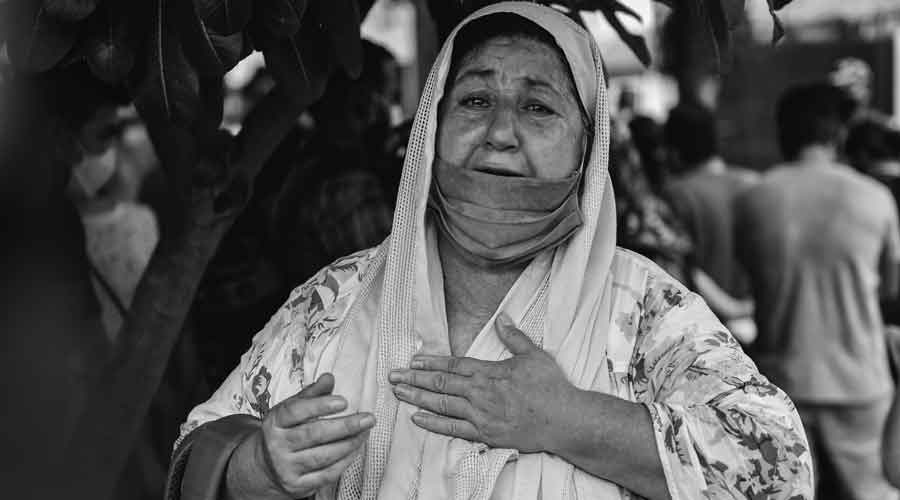A woman JNU student is stuck at her home in central Afghanistan, watching Taliban gunmen roam the streets, as she awaits her visa to be able to study in India.
An Afghan student of Punjab University in Chandigarh keenly follows every piece of credible news from home to try and gauge his future prospects, while his wallet grows lighter every day.
Their futures caught in the quagmire of a coup in Afghanistan, these students, some of the brightest from their country, now depend on the support of friends and a few NGOs and student groups that have begun relief efforts ordinarily performed by governments.
The JNU student, holder of a scholarship from the Indian Council of Cultural Relations (ICCR), had contacted her university several times since July 26 as the Taliban closed in. She had secured admission last year from Afghanistan and been attending online classes for the past year from home.
By the time the university responded, the Taliban had taken control of Kabul and the airport was shut.
“They (JNU) were ignoring what I was facing. Later they said that it’s not just the bona fide certificate, they also need to contact the ICCR,” the student told The Telegraph over the phone.
A bona fide certificate is one a university issues declaring a person as its student. It helps in getting a visa.
“They said it would take 15 days. Now they have finally said that nothing is required from me; they will internally process it. I’m waiting, but the situation at Kabul airport is bad.”
In response to requests from several Afghan students and the JNU students’ union, university registrar Ravikesh had said last Saturday that “the matter is being looked into”.
On Wednesday, the registrar said that bona fide certificates would be issued to those whose visas are due to expire soon.
Delhi University and the IITs had proactively facilitated visas for their Afghan students as soon as the Taliban began their march on Kabul in July. Some of these students have arrived in India.
“There are reports of firing by the Taliban to control crowds at the airport and some say there have been injuries and deaths. Only military aircraft are operating and we don’t have information on civil flights,” the JNU student said.
“The Taliban search homes but don’t say anything to us. For now, they have just taken away cars from some. Many people fear that the moment they get international recognition and foreign troops leave the airport, they may target former government officials, journalists and women activists. They have reportedly killed civilians without warning in Jalalabad. My parents want me to escape anywhere possible.”
The Punjab University student, Farhad Haqyar — a 25-year-old ICCR scholar who is about to complete a master’s in journalism and communication --- has appealed to the Indian government for extensions of scholarships to Afghan students like him.
Else, he says the United Nations should provide a dole until Afghans studying overseas find their feet.
“There are some Afghans in India, including girls, with just Rs 100 left…. There is no financial support from home now as many cannot go to work any more,” Haqyar said.
“In a few months, we will know if we have a working government and whether we can go back or go elsewhere. But at least until then, the ICCR can support us with the funds that were to be given to scholarship winners who now cannot come to India.”
Haqyar is from the Panjshir Valley, where the anti-Taliban resistance is based. He was brought up in Kabul. His father, a government employee who has now confined himself to his home, lived through the brutal Taliban takeover of 1996.
“A couple of months ago I had planned to return home and start an advertising company. Suddenly everything has changed and I see my ambitions escaping from me,” Haqyar said.
“If the Taliban and other parties form an inclusive government, it will be a big opportunity for us. I’m ready to work in any situation if such a government is in place irrespective of who the ruler is,” he added.
“For 25 years I have just breathed and not lived. Here I see couples enjoying themselves and going to the cinema. Back home, women pray at home just for the men to come back home alive. I just want to live for 20 years in tranquillity. It’s easy to capture Afghanistan but hard to rule it.... If the Taliban change 10 per cent, we can restrict ourselves too.”
Sarhad, an NGO, is able to offer some help to those like Haqyar, if not the JNU student. Its president Sanjay Nahar told this newspaper that the organisation had shortlisted 25 students whose savings had run out.
“For now, we are going to give Rs 5,000 to each of them, which may not last long. We intend to do a survey of how many are in need. We have helped them during the pandemic too,” he said.
Nahar has petitioned a university in Pune to allow three women Afghan students to write the entrance test for the PhD programme although their visas — for the master’s course -- are about to expire.
CPM student arm SFI is trying to help Afghan students at varsities across India. Its general secretary, Mayukh Biswas, said his organisation had recently taken up the cause of a recently arrived Afghan student of Jadavpur University who has been unable to join his programme as the regime change has left some of his documents in limbo.
“We ask institutions to extend all help to their Afghan students in getting visas and places to stay. IIT Bombay has been most forthcoming,” Biswas said.
“We also plan to appeal to the public to help students who need housing or financial assistance. But in the long run, institutions must offer scholarships. We are writing to MPs to ask this of the government.”











